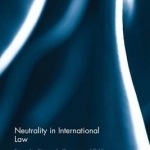Neutrality in International Law: From the Sixteenth Century to 1945
BookThis item doesn’t have any media yet
2017 | History & Politics
Neutrality is a legal relationship between a belligerent State and a State not participating in a war, namely a neutral State. The law of neutrality is a body of rules and principles that regulates the legal relations of neutrality. The law of neutrality obliges neutral States to treat all belligerent States impartially and to abstain from providing military and other assistance to belligerents. The law of neutrality is a branch of international law that developed in the nineteenth century, when international law allowed unlimited freedom of sovereign States to resort to war. Thus, there has been much debate as to whether such a branch of law remains valid in modern international law, which generally prohibits war and the use of force by States. While there has been much debate regarding the current status of neutrality in modern international law, there is a general agreement among scholars as to the basic features of the traditional law of neutrality. Wani challenges the conventional understanding of the traditional neutrality by re-examining the historical development of the law of neutrality from the sixteenth century to 1945.
The modification of the conventional understanding will provide a fundamentally new framework for discussing the current status of neutrality in modern international law.
Related Items:
| Published by | Taylor & Francis Ltd |
| Edition | Unknown |
| ISBN | 9781138284777 |
| Language | N/A |
Images And Data Courtesy Of: Taylor & Francis Ltd.
This content (including text, images, videos and other media) is published and used in accordance
with Fair Use.
